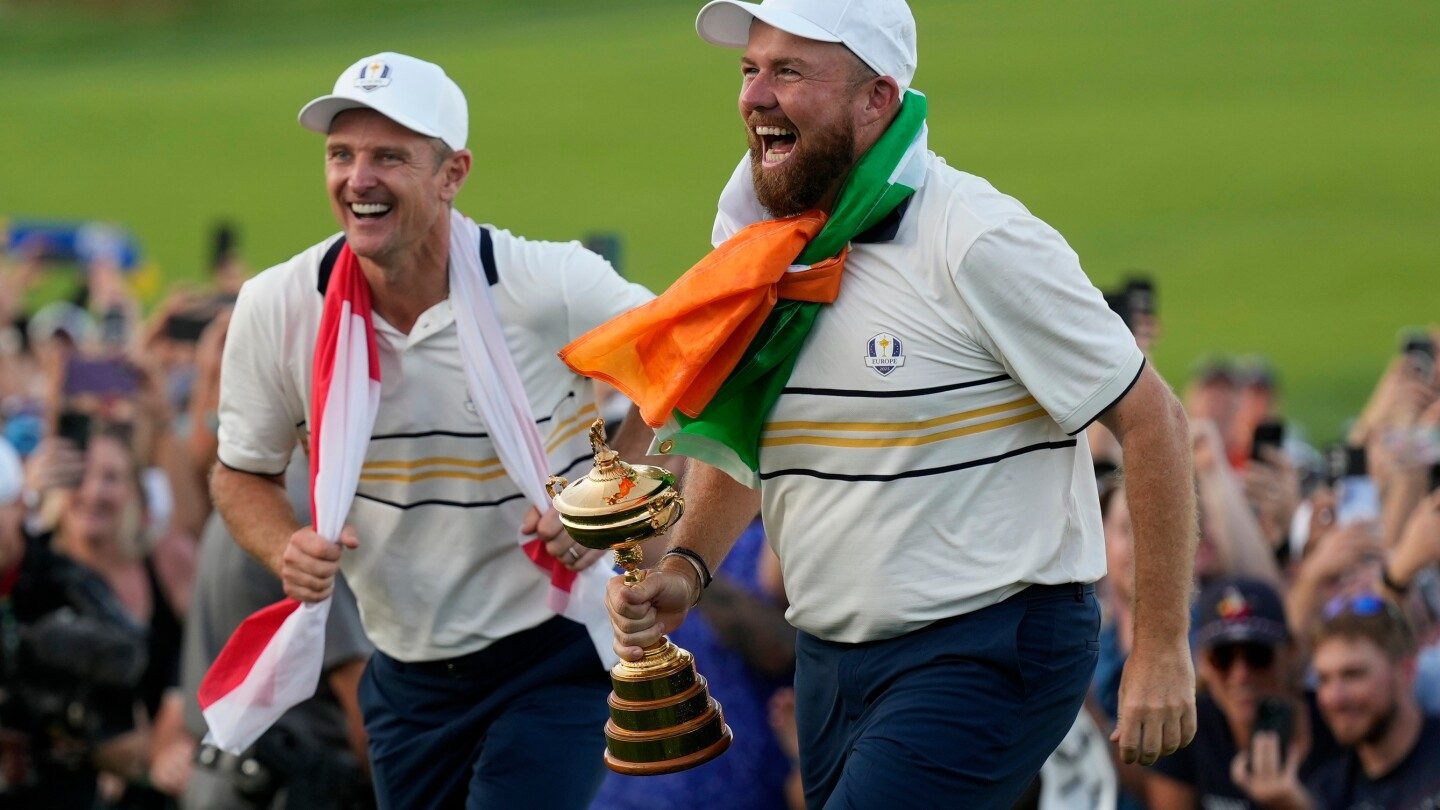FARMINGDALE, NY (AP) — Rory McIlroy still remembers the tears of his tough Ryder Cup loss. What hurt him most were the words he said on that Sunday four years ago at Whistling Straits, where the U.S. won 19-9, the biggest Ryder Cup rout of Europe in history. The crowd was overwhelmingly American because of travel restrictions related to the COVID-19 pandemic, and the U.S. team featured 12 players in exceptional form, something that doesn't often happen.
“I was trying to tell the guys, ‘We’re going to get to 20 points,’ because this is going to be the next era of Ryder Cup teams for the U.S.,” Patrick Cantlay said at the time. “If we play like we did this week, the scoreboard will be the same over there,” Jordan Spieth added. McIlroy couldn’t help but recall those predictions as Europe celebrated its second consecutive victory since that tough defeat, winning by a narrow 15-13 victory.
He looked at the flags each teammate carried from their respective countries, all proud of the Team Europe emblem on their jerseys. Hidden away was the portrait of Seve Ballesteros, sewn inside the jersey, touching their hearts.
Reflections on American Dominance
“The comments and what people were saying after Whistling Straits about the decades of American dominance motivated us,” McIlroy said. “American dominance” ended six years after continental Europe was invited to the competition, and there are no signs of that changing anytime soon. Playing on a New York golf course in front of a hostile and disruptive crowd only further motivated Europe, which set a Ryder Cup record—under the current format since 1979—by losing only four of 16 team matches before Sunday.
No one had managed to overcome a deficit of more than four points, and Europe was up by seven points.
The finish was a close one—too close for Europe—until Shane Lowry made the most important putt of his life to secure the golden trophy. McIlroy has claimed for the past two years that winning a Ryder Cup on the road is one of the greatest achievements in golf, referring to the Americans, who haven't done so since 1993. Europe has now secured its fifth away victory in the last 10 Ryder Cups and has won 11 of the last 15 tournaments, defining its dominance.
The Changing of the Guard and the Donald Factor
“When you think about the last Ryder Cup away and what people were saying about decades of American dominance, whether at home or away, what we’ve achieved in Rome and here has left a lot of people speechless,” McIlroy said. Whistling Straits and the U.S. victory at Hazeltine in 2016 are starting to look like a mere stumble rather than a solid foundation. Captain Luke Donald was informed that Europe had dominated the last decade and was in a position to do so in the next. At that point, Lowry chimed in: “You told us we wouldn’t win one for 20 years.”
The Americans really gave Europe a scare, but that took all the magic they could muster. Cameron Young and Justin Thomas had to sink 12-foot birdie putts on the 18th hole to win their matches. Eight of the individual matches went to the 18th hole, the most in the Ryder Cup since 1993. In both years, a European did not play, and an American whose name was on the envelope—Lanny Wadkins in 1993, Harris English this time—received a draw.
Perhaps what the Americans didn't see coming after their breakthrough win at Whistling Straits was a changing of the guard. Lowry, Tyrrell Hatton, and Viktor Hovland were Ryder Cup rookies. Jon Rahm, Matt Fitzpatrick, and Tommy Fleetwood were playing in their second tournament. Together, they compiled a 13-5-5 record at Bethpage Black. And then there's the Donald factor—the European captain, not Friday's Ryder Cup wildcard, who watched Air Force One fly over the 15th fairway. He was sidelined when Europe selected Henrik Stenson for the 2023 matches in Rome.
Stenson then joined LIV Golf and was stripped of his captaincy. Donald had just 13 months to prepare and has made the right decisions ever since.
U.S. captain Keegan Bradley called Donald the “greatest European captain of all time.” “He won home and away, and he won a Ryder Cup in New York at Bethpage,” Bradley said. “He turned this European team into an unstoppable force, especially in the first two days. … He put his team in the best position to win.”
How close was victory? Despite the Americans' best effort, Europe only needed a draw out of the six matches remaining to capture the cup. There were no European blue scores on the board, but all the matches were very close. Lowry did his job, with help from Russell Henley, who left two short 10-foot birdie putts on the 17th and 18th holes that would have given him the victory. Hatton let Collin Morikawa slip away by missing three consecutive birdie opportunities from 8, 5, and 12 feet.
However, they were never in serious trouble and ended up achieving another draw that made Europe the clear winners.
So now we look ahead to Ireland in 2027, a chance for the Americans to end a 34-year away winless streak and break a six-year Ryder Cup winless streak. The 17-inch cup is returning to the UK, a trophy the Americans only seem to borrow occasionally.






